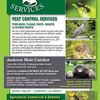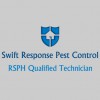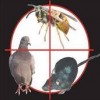
N.W.D.S Pest Control has over 30 years of experience. We pride ourselves on providing solutions and specialist consulting advice for domestic, commercial and public sectors in Swindon, Wiltshire. N.W.D.S offers pest control treatments and extermination for rats and mice, wasps and flies, moles and rabbits, fleas and bugs, birds, deers and foxes in the Swindon area.
If you would like more information regarding our Swindon pest control service or would like to chat with a friendly voice, call us on 01793 770807 or send us a message with your specific request, we look forward to speaking with you soon! Called about a wasp's nest, very friendly and helpful on the phone. Steve came round the next morning, dealt with it efficiently, and wasps were gone by the end of the day.
If you would like more information regarding our Swindon pest control service or would like to chat with a friendly voice, call us on 01793 770807 or send us a message with your specific request, we look forward to speaking with you soon! Called about a wasp's nest, very friendly and helpful on the phone. Steve came round the next morning, dealt with it efficiently, and wasps were gone by the end of the day.
Services
Rat and mice extermination and removal using the latest second-generation baits and poison to exterminate this type of vermin.
The common rat, Rattus Norvegicus, also known as the brown rat, is the most common species.
Dropping is a good indication of the size of the problem, rats can produce up to 40 droppings per day.
The droppings can also indicate the species of the rodents.
Rat droppings are spindle-shaped and average 3mm in length.
Fresh droppings appear soft and shiny, depending on the environmental conditions they will become hard and dull.
The common rat, Rattus Norvegicus, also known as the brown rat, is the most common species.
Dropping is a good indication of the size of the problem, rats can produce up to 40 droppings per day.
The droppings can also indicate the species of the rodents.
Rat droppings are spindle-shaped and average 3mm in length.
Fresh droppings appear soft and shiny, depending on the environmental conditions they will become hard and dull.
The mole is widespread throughout Great Britain.
They have large shovel-shaped front limbs which are used for digging, very small eyes and no external ear flaps.
Adult moles are solitary and live almost entirely underground in tunnels which can extend over a large area.
They will have two depths of tunnels.
The deepest will be between 2-8in or more below the surface.
This is when you will see molehills, which is the excavated soil from the tunnel system.
The other type is the surface tunnel which is just below the ground and can be recognised by soil or grass pushed up as a ridge along the length of the run.
They have large shovel-shaped front limbs which are used for digging, very small eyes and no external ear flaps.
Adult moles are solitary and live almost entirely underground in tunnels which can extend over a large area.
They will have two depths of tunnels.
The deepest will be between 2-8in or more below the surface.
This is when you will see molehills, which is the excavated soil from the tunnel system.
The other type is the surface tunnel which is just below the ground and can be recognised by soil or grass pushed up as a ridge along the length of the run.
Traces of flea feces are little black specks on your pets fur and skin.
Look for them especially around their head and ears, on their back of the next, on their root of the trail or on the tail itself.
Fleas live on the outside of the body of animals (ectoparasites) and need to feed on the blood of these animals to be able to produce eggs.
Fleas usually feed and lay their eggs while the pest is sleeping, the pet's resting areas are where most fleas will be found.
Many pets acquire fleas outside.
Look for them especially around their head and ears, on their back of the next, on their root of the trail or on the tail itself.
Fleas live on the outside of the body of animals (ectoparasites) and need to feed on the blood of these animals to be able to produce eggs.
Fleas usually feed and lay their eggs while the pest is sleeping, the pet's resting areas are where most fleas will be found.
Many pets acquire fleas outside.
Bird control netting can be very effective.
Bird control needs to be handled with care.
Birds can be a nuisance, noisy and their faeces can be very acidic staining garden furniture and attracting vermin.
Bird Netting Packs - We can supply and install netting.
Our bird netting packs come with instructions and everything you need to effectively install a proper pigeon netting package.
We can advise on net installations for many types of property.
If you would like a survey, please call 01793 770807 or contact us using our enquiry form!
Bird control needs to be handled with care.
Birds can be a nuisance, noisy and their faeces can be very acidic staining garden furniture and attracting vermin.
Bird Netting Packs - We can supply and install netting.
Our bird netting packs come with instructions and everything you need to effectively install a proper pigeon netting package.
We can advise on net installations for many types of property.
If you would like a survey, please call 01793 770807 or contact us using our enquiry form!
Deer can be quite a problem in areas where the animal's natural habitat and food sources are being eliminated by man or natural disasters.
These animals are harder than other wildlife to repel from unwanted areas due to their size and food requirements.
In many cases, the deer seen in gardens are starving and can be quite persistent in foraging on ornamental plants, fruit trees and vegetable gardens.
Having the odd deer appear in your garden should not be a concern, especially as they are so beautiful - but be warned, usually deer travel in a herd, if they think they have found a large garden where the owners actively encourage their visits - before you know it you can have a major problem on your hands!
These animals are harder than other wildlife to repel from unwanted areas due to their size and food requirements.
In many cases, the deer seen in gardens are starving and can be quite persistent in foraging on ornamental plants, fruit trees and vegetable gardens.
Having the odd deer appear in your garden should not be a concern, especially as they are so beautiful - but be warned, usually deer travel in a herd, if they think they have found a large garden where the owners actively encourage their visits - before you know it you can have a major problem on your hands!
Reviews

Be the first to review NWDS Pest Control.
Write a Review




